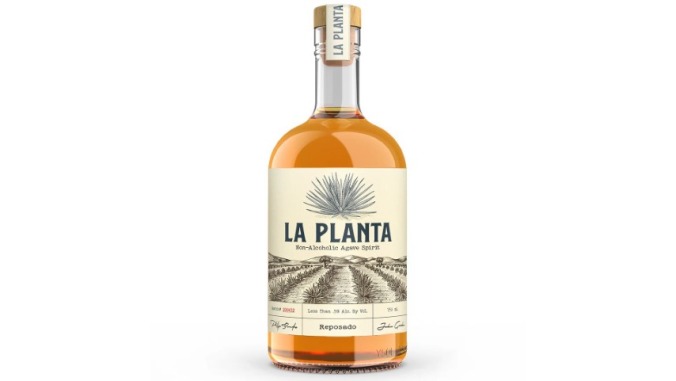La Planta Non-Alcoholic Reposado Tequila Alternative Review
Photos via Phil & Goode
Few areas of the adult beverage market has seen as much excitement (and reams of copy) in the last few years as non-alcoholic alternatives to traditionally boozy beverages. These are often all lumped in together, with NA beer, wine, spirits, cocktails, etc. sharing the same shelf space and ad copy. But the fact of the matter is this: Where it has become increasingly easy to pull off spectacular NA beers that can just about pass for the real thing, and broadly acceptable NA wines, non-alcoholic spirits have had a much more difficult road toward potability. Finding a quality NA beer, even at 0.0% ABV? That has become so easy, any consumer can do it. But making an NA spirit/cocktail base that doesn’t either fall into a weird, uncanny valley or actively taste bad? That’s been much harder for companies to crack, despite a whole lot of efforts in this vein. It’s understandable why so many are competing to become dominant players in an emerging NA spirits market, dreaming of the slice of the pie they might be able to eventually dominate by getting in early. But for all the bottles I’ve tried, I’ve yet to find one that reminds me much of the spirit it’s aping, much less is something I actively want to drink on a regular basis. And unfortunately, that hasn’t changed after tasting La Planta Non-Alcoholic Reposado Tequila Alternative.
Catchy name, right? That’s just another issue of non-alcoholic spirits that tends to become awkward–they have a hard time succinctly expressing and explaining what exactly they are, a factor only compounded by most producers having proprietary methods that they don’t want to reveal to the public/each other. In this instance, you can’t legally call this “tequila,” but apparently if you add the word “alternative” then “tequila alternative” is exceptional. By saying “it’s an alternative to tequila,” they can at least inform you that this is meant to specifically evoke tequila, rather than having to settle for something like “agave spirit.” The only bad news is that, uh, well it doesn’t really taste much like tequila. But at an MSRP of $35, at least it does so in a fairly affordable way?
Details on how La Planta is produced from parent company Phil & Goode (of Bravus Brewing NA beers) are on the scant side, but that is common for this industry, where trade secrets are paramount and most details just tend to raise further questions if you have any familiarity with traditional distillation. La Planta’s press materials, for instance, say that it is made with “agave, oak and natural tequila flavor,” but does “agave” mean actual, roasted pinas of the agave plant? Agave syrup? Does “oak” imply this was aged in oak barrels, or on oak chips, or was oak flavor (and color) added by some other means? When you think about it, what does the word “spirit” even mean in a non-alcoholic context; is there a real definition here? I asked that question and got this reply back via email from founder Philip Brandes:
“In the context of Phil & Goode, “non-alcoholic spirit” tries to unambiguously convey to the consumer that this is an alcohol-free alternative which looks, smells, and tastes like its alcoholic counterpart. Thus, it is meant to be enjoyed neat, over ice, or combined with ingredients to create a non-alcoholic cocktail.”
The theme here is essentially “better for you” in nature, with the company leaning into natural ingredients without giving away much detail on what those ingredients are, or how exactly they benefit the drinking experience. La Planta Non-Alcoholic Reposado Tequila Alternative, for instance, is made with white button mushroom extract among other things, which Brandes says “naturally preserves the freshness of our spirits, and provides a source of nutrients and bioactive compounds such as Vitamin D, Selenium, Potassium and antioxidants.” Personally, I tend to place more importance on how these ingredients actually taste, but I’m not going to complain about getting more potassium or antioxidants in my diet either. Notably, the company doesn’t really get into all of the ingredients involved, for instance not mentioning how exactly they added a noticeable level of “burn” to the product. We’re sort of left guessing here.
-

-

-

-

- Curated Home Page Articles By Test Admin October 21, 2025 | 3:10pm
-

- Curated Home Page Articles By Test Admin October 21, 2025 | 2:57pm
- Urls By Test Admin October 21, 2025 | 2:57pm
- Curated Home Page Articles By Test Admin October 21, 2025 | 2:55pm
-

-

-

-

-

-

-

-

-

-

-

-

-

-

-

-

-

-

-

-

-

-

-

-

-

-

-

-

-

-

-




































